Introduction
What To Feed To Pigeons: Pigeons, often regarded as the gentle birds of urban landscapes, have been a familiar sight in cities and towns across the world for centuries. These birds, known for their distinctive cooing sounds and graceful flight, have a unique place in our shared human history. Whether you encounter them on bustling city streets, in quiet parks, or even perched on the windowsills of your own home, pigeons have a knack for captivating our attention and sparking curiosity about their needs and behaviors. Feeding pigeons can be an enjoyable pastime for many, whether you’re a dedicated bird enthusiast or simply a kind-hearted individual who wants to some nourishment to these feathered friends.
Feeding pigeons carrier isn’t as straightforward as tossing them breadcrumbs or leftover bits of sandwich. It requires an understanding of their dietary needs, as well as the potential consequences of providing the wrong types of food. In the world of pigeon nutrition, exploring what pigeons eat in the wild and what they can safely consume when offered food by humans. We will discuss the importance of a balanced diet for pigeons and the potential harm of feeding them inappropriate or unhealthy items. We’ll touch on the ethical and environmental considerations surrounding pigeon feeding in urban settings.
As you learn more about what to feed pigeons, you’ll gain insights into how to promote the well-being of these urban birds while also ensuring that your interactions with them are respectful and responsible. Whether you’re a city dweller who frequently encounters pigeons on your daily commute or a nature enthusiast curious about these adaptable avian creatures, this will equip you with the knowledge you need to make informed decisions about what to feed to pigeons. So, the dietary preferences and requirements of our feathered companions, and in doing so, foster a deeper appreciation for the beauty they bring to our urban landscapes.
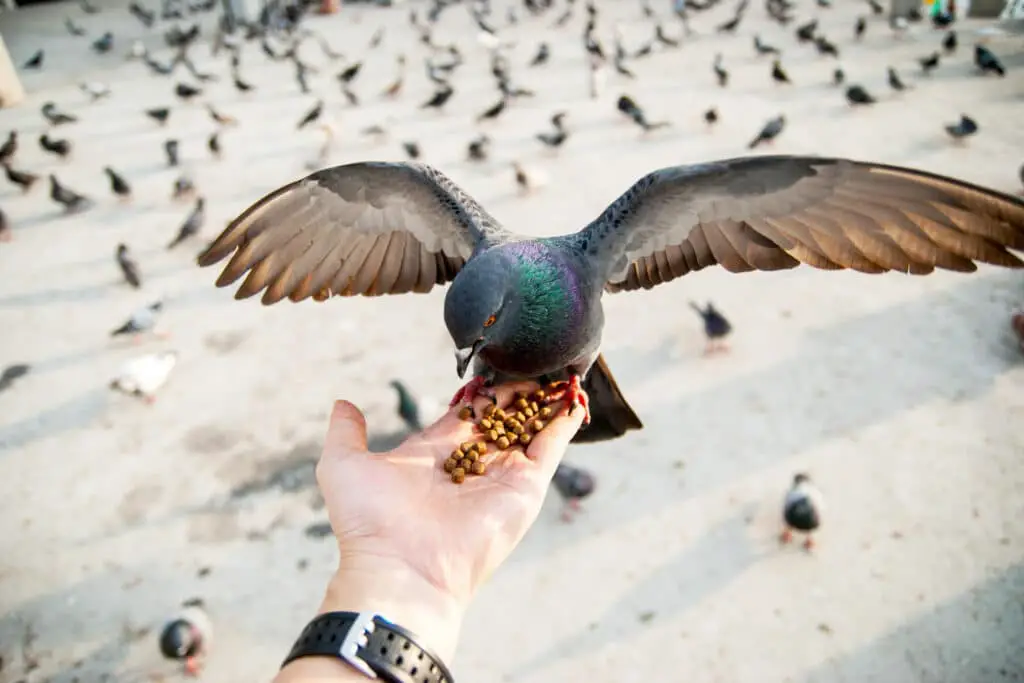
Which is the best food for pigeons?
Pigeons eat grasses, leafy greens, berries, herbs, fruits, berries, grains, weeds, insects, and worms. It’s not a good idea to feed pigeons bread for many reasons. It’s best to set up a feeding box with appropriate options healthy for pigeons. Wild pigeons eat millet, cracked corn, sunflower seeds, and sorghum.
Pigeons thrive on a diet rich in seeds and grains. Some of their favorite choices include wheat, barley, corn, and sunflower seeds. These foods are readily available and serve as staple nutrition for pigeons. Leafy greens like lettuce, spinach, and kale can be a valuable to a pigeon’s diet. These greens vitamins and minerals while adding variety to their meals.
Pigeons occasionally consume fruits like berries, grapes, and cherries. While fruits should not be a primary source of nutrition, they can be offered as an occasional treat. Specially formulated pigeon feed is available in many pet stores. These feeds are designed to meet pigeons’ nutritional needs and can be a convenient option for pigeon enthusiasts.
Clean, fresh water is essential for pigeons. Ensure they have access to a water source at all times, especially if you’re dry seeds, which can be dehydrating. While knowing what to feed pigeons is it’s equally crucial to be aware of foods that should be avoided.
What household items can you feed pigeons?
If you don’t have access to bird food, you can short-term feed a rescued pigeon or dove minced carrots, broccoli, cauliflower, edamame, lima beans, bell peppers, corn, unsalted chopped nuts, uncooked popcorn kernels, unsalted sunflower seeds (shelled or not), rice, quinoa or lentils (cooked or raw).
Plain, unsalted popcorn can be an occasional treat for pigeons. It’s low in fat and can be a source of carbohydrates. Plain, cooked rice is another option. Ensure it is plain and not cooked with added salt or spices. Rice can be a source of carbohydrates for pigeons. Rolled oats or oatmeal, preferably without added sugar or flavorings, can be a suitable to a pigeon’s diet. They fiber and essential nutrients.
Plain, cooked pasta like spaghetti or macaroni can be offered in small quantities. Avoid pasta sauces or seasonings. Small amounts of uncooked rice and lentils can be scattered on the ground for pigeons to peck at. However, ensure that they have access to fresh water as uncooked rice can expand when consumed. Crushed eggshells are a good source of calcium, which is beneficial for pigeons, especially during breeding season. Rinse and dry the eggshells, then crush them finely before offering.
While not a household item, fresh greens like lettuce, spinach, and kale from your kitchen can be shared with pigeons. These greens offer essential vitamins and minerals. Occasional small pieces of fruits like berries, grapes, or apple slices can be offered as a treat. Remove seeds and avoid feeding them citrus fruits. Pigeons can enjoy unsalted nuts like peanuts, almonds, or cashews in moderation. Nuts should be crushed or broken into smaller pieces to prevent choking hazards.
What are 3 things pigeons eat?
Pigeons have a broad diet in their natural environments, which includes seeds, grains, fruits, and insects. Depending on where they live, they might also eat leaves and flowers from plants. They are very flexible and can find food in many different places, which allows them to live in different environments.
Seeds and grains are staple foods in the diet of pigeons. In the wild, they forage for various types of seeds and grains found on the ground, such as wheat, barley, corn, and millet. These foods essential carbohydrates, proteins, and fats, which are necessary for their energy and overall health. Pigeons have specialized beaks that help them crack open seeds and grains with ease, making them well-suited to this diet.
Pigeons are opportunistic feeders and will consume small fruits and berries when available. While fruits are not a primary food source, they can be an occasional part of their diet. Pigeons may eat fruits like berries, grapes, and cherries when they come across them in urban environments or during certain seasons. Fruits vitamins and natural sugars, offering pigeons a diverse range of nutrients.
Although seeds and grains make up the bulk of a pigeon’s diet, these birds are not strictly herbivores. Pigeons will occasionally consume insects and worms, particularly when they need a protein boost. Insects and worms are a valuable source of protein and can be essential for pigeon health, especially during the breeding season when parents require extra nutrients to feed their chicks.
Can I feed pigeons rice?
Rice should not cause any problems to baby birds. Larger birds such as doves and pigeons eat rice as a whole grain, but their esophagus is much larger. Breeding birds are expected to bring only a small amount of rice to the chicks anyway. Parent birds switch to a high-protein diet while raising the young in the nest.
Feed pigeons in moderation. Excessive feeding can lead to dependency on human handouts and disrupt their natural foraging behaviors. Offer a varied diet, including grains, seeds, and breadcrumbs. This diversity ensures they receive the necessary nutrients.
Avoid feeding pigeons spoiled or moldy food. Clean and fresh options to prevent health issues. Pigeons need access to clean water for drinking and bathing. Ensure a nearby water source if you intend to feed them. While pigeons may eat processed foods like chips or cookies, these items lack nutritional value and can harm their health. Stick to natural foods.
If you choose to feed pigeons, do so in open areas away from traffic and pedestrians to reduce the risk of accidents. Check local regulations before feeding pigeons, as some cities may have ordinances against feeding wildlife. It’s worth noting that pigeons are adaptable birds with a strong instinct for foraging. While supplemental feeding can sustenance, it’s essential to allow them to maintain their natural foraging skills.
Can I feed pigeons bread?
Bread does not contain the necessary protein and fat birds need from their diet, and so it can act as an empty filler. Although bread isn’t harmful to birds, try not to offer it in large quantities, since its nutritional value is relatively low.
Feed pigeons bread in moderation. Make it an occasional treat rather than a primary food source. Bread should be considered a supplement, not a staple. A diverse diet that includes grains, seeds, and other bird-friendly foods. If you decide to feed pigeons bread, break it into small pieces to make it easier for them to eat and digest.
Offer fresh bread, and avoid feeding them stale or moldy pieces, which can be harmful to their health. Pigeons need access to clean water for drinking and bathing. Ensure a nearby water source if you intend to feed them. Just like with other human foods, avoid feeding pigeons processed items like chips or cookies. Stick to natural, unprocessed foods.
Whenever possible, encourage pigeons to forage for natural food sources to maintain their self-sufficiency and natural behaviors. Feeding pigeons bread can be done safely and responsibly, as long as it is done in moderation and as part of a varied diet. While bread is not an ideal staple food for pigeons due to its limited nutritional value, it can be an occasional treat.
What do pigeons drink?
A pigeon needs water for digestion and processing of food. Per day, a pigeon drinks around 50 ml of water. If there are young to feed, this will double. The best thing is to give your pigeon fresh tap water every day.
In their native habitats, pigeons primarily drink from natural water sources such as rivers, lakes, streams, and ponds. These bodies of water clean and fresh water for their hydration needs. In urban areas, pigeons often rely on alternative water sources, including puddles, rainwater, and even moisture from damp surfaces like building ledges and rooftops.
Pigeons are known to drink from human-made sources like birdbaths, fountains, and water features commonly found in parks and gardens. These sources are especially for urban pigeons, as natural water bodies may be scarce in densely populated areas. Pigeons also obtain moisture from the food they consume. Many of the grains, seeds, and breadcrumbs that pigeons eat contain some level of moisture, which contributes to their hydration.
Water is essential for pigeons’ survival, just as it is for all living creatures. Without sufficient hydration, pigeons can suffer from dehydration, which can lead to various health issues. Dehydrated pigeons may exhibit symptoms such as lethargy, sunken eyes, and reduced activity. Pigeons have a remarkable ability to find water sources, and they are known for their daily rituals of drinking. They often visit water sources in the morning and evening to stay hydrated.
Do pigeons need salt?
“Pigeons do need salt in their diets, but not in large doses, and generally acquire this through their normal diet of plant and animal food sources,” Dr. Sheppard said in an e-mail message. Some experts contacted through the New York Bird Club said that pigeons would often peck at anything that might be food.
Sodium is a crucial electrolyte that helps maintain proper fluid balance in the pigeon’s body. It ensures that bodily fluids, such as blood and cellular fluids, are at the right concentration. Sodium ions are necessary for nerve cell function. They are involved in transmitting electrical signals, allowing pigeons to respond to various stimuli and control their movements.
Sodium ions are involved in the process of muscle contraction. This is essential for pigeons in activities such as flying, perching, and foraging. Sodium is also involved in the digestion process. It helps regulate the pH levels in the pigeon’s stomach, ensuring efficient breakdown of food. Pigeons, like many animals, can obtain the necessary sodium from their natural diet and the environment. They typically do not need salt supplementation.
In the wild, pigeons feed on a variety of foods, including seeds, grains, and small insects, which naturally them with the sodium they require. Excessive salt can be harmful to pigeons and other birds. High salt intake can lead to dehydration, kidney problems, and other health issues. Therefore, it is generally not to offer salt directly to pigeons. Pigeons often consume small quantities of soil and minerals from the ground, which can contain essential minerals like sodium.
What vegetables do pigeons eat?
Pigeons feed on a wide range of plants, but seem particularly keen on the leaves of brassicas (such as broccoli, sprouts, cabbages and cauliflower), cherries, lilac and peas. They will peck at the leaves and rip off portions, often leaving just the stalks and larger leaf veins.
Pigeons may consume lettuce, but it is not particularly nutritious for them. Iceberg lettuce, in particular, has a high water content and minimal nutritional value, so it should be offered sparingly. Pigeons can eat spinach in moderation. It contains essential vitamins and minerals, including vitamin K and iron. Pigeons may peck at broccoli florets. It offers vitamins like vitamin C and contains fiber, making it a reasonably nutritious option.
Similar to broccoli, pigeons might nibble on cauliflower. It some vitamins and fiber. Pigeons can eat carrots, which are a good source of beta-carotene and fiber. Chopped or grated carrots are easier for them to consume. While not a common pigeon food, radishes are safe for them to eat. They have some nutrients and a bit of variety.
Pigeons can eat green peas, which offer protein, fiber, and various vitamins and minerals. Frozen peas, thawed and without seasoning, are a suitable option. Pigeons might consume cooked lentils, which are rich in protein and fiber. These vegetables are safe for pigeons and offer vitamins, minerals, and hydration due to their high water content.
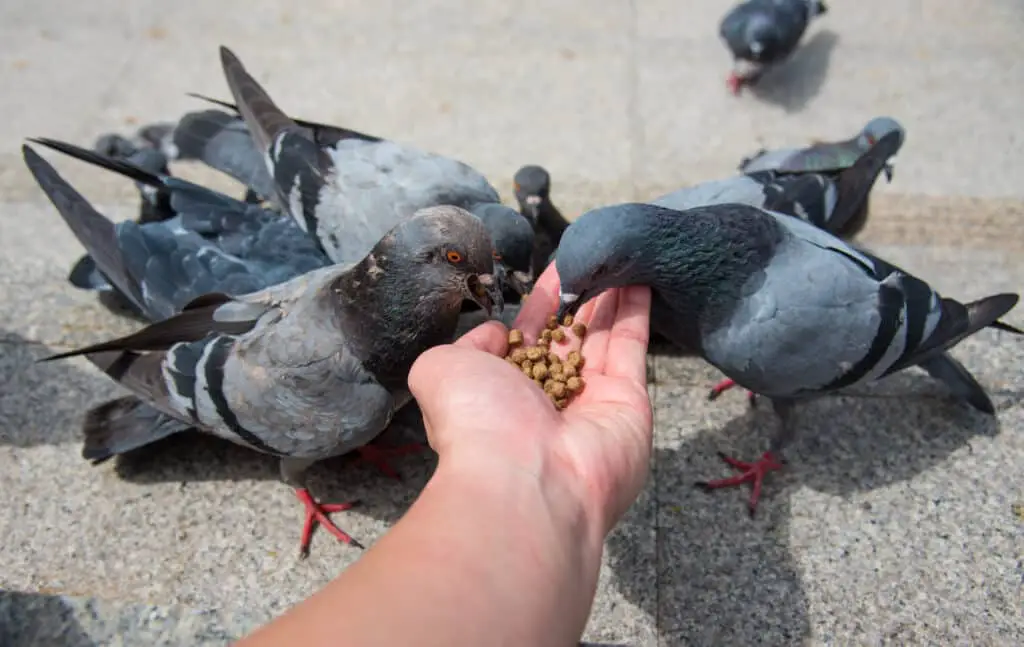
Conclusion
In feed pigeons is not only a matter of sustenance to these ubiquitous urban birds but also a way to foster a harmonious coexistence between humans and wildlife. Pigeons, often overlooked and sometimes even considered a nuisance, play a unique role in our urban ecosystems. As their dietary needs are specific, and a well-informed approach to feeding them is essential for their well-being. One of the key takeaways from our discussion is the offering of pigeons a balanced and nutritious diet. While they can scavenge for food in urban environments, them with wholesome options can ensure their health and vitality.
Foods like grains, seeds, and greens are excellent choices, as they mirror the natural diet of pigeons in the wild. Avoiding processed foods, especially those high in salt and sugar, is crucial to prevent health issues and promote their longevity. We’ve touched on the ethical and environmental considerations of pigeon feeding. Feeding pigeons should be a responsible act, mindful of the potential impacts on the environment and other wildlife. Overfeeding can lead to overcrowding, waste buildup, and potential health problems for the pigeons themselves. Therefore, moderation in feeding and choosing appropriate locations for feeding are essential practices to keep in mind.
Pigeon feeding highlights the broader theme of urban wildlife conservation. Pigeons are just one of the many species that have adapted to city life, and how we interact with them can serve as a model for our interactions with other urban pigeon wildlife. By respecting their needs and the natural order of things, we can create urban environments that are not only welcoming to humans but also sustainable for the diverse species that call our cities home. By offering them the right foods in moderation and being mindful of the environment, we can continue to appreciate the beauty of pigeons in our urban landscapes while promoting their health and well-being.

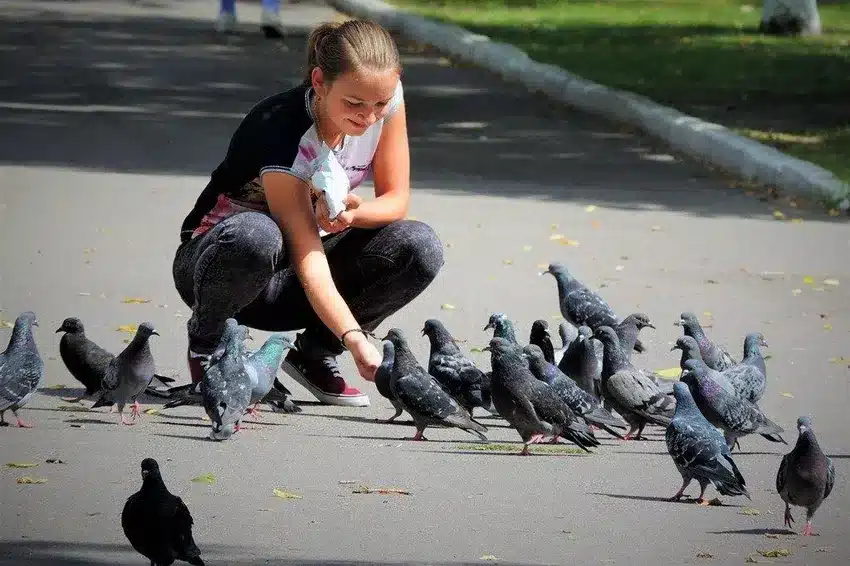
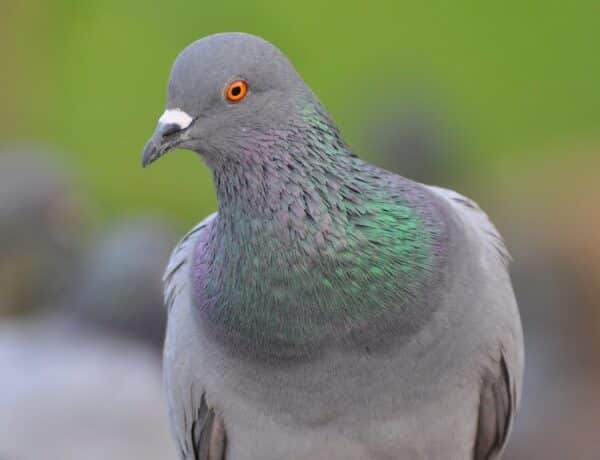
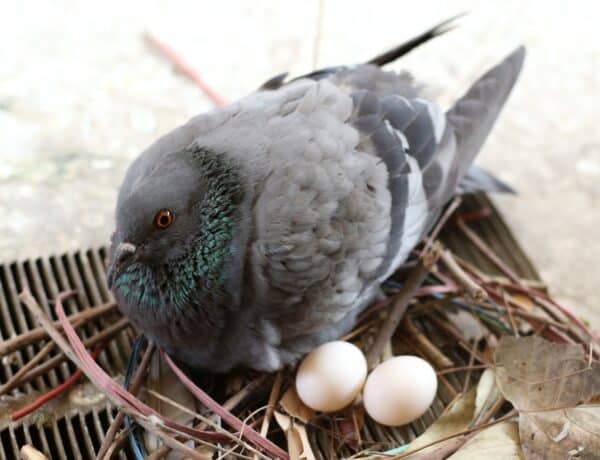
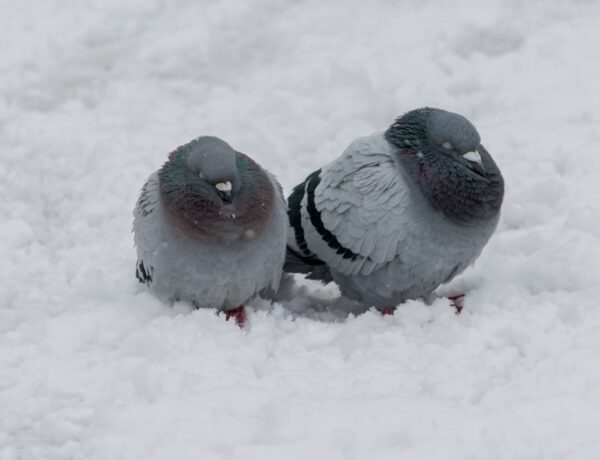
No Comments